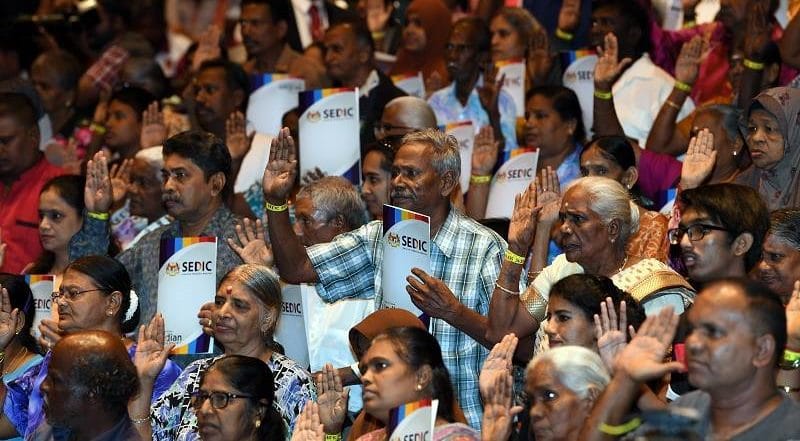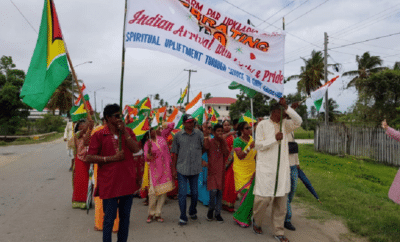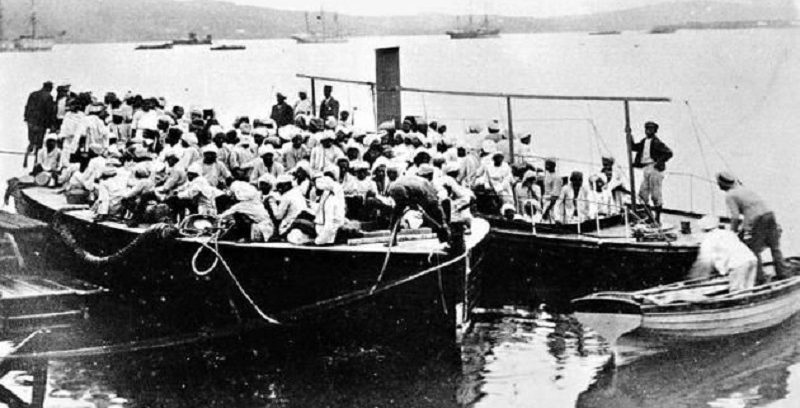Immigration
Opposition Parties Slam Malaysian Govt for ‘Statelessness’ of Indians

People hold placards for Socioeconomic Development of Indian Community Unit (SEDIC) that was designated to implement Malaysian Indian Blueprint for upliftment of the community.
Facebook/ Pusat Aduan Rakyat
The opposition claimed that there were 300,000 stateless Indians, a figure Malaysian Prime Minister Najib Razak called a “fairy tale”.
Descendants of Indian indentured laborers, commonly called “stateless Indians”, are still struggling to attain citizenship in Malaysia while the federal government and opposition debate the size of their population. The opposition parties in Malaysia recently slammed Barisal Nasional (BN) for the continuing stateless situation of one of the largest Indian communities outside the subcontinent.
There are 12,000 stateless Indians, which includes Hindus, Buddhists, Sikhs, Christians and Muslims, according to a recent survey by the NGO MyDaftar. The people of Indian origin are mainly Tamil-speaking while a significant number speak Telugu, Malayalam, Hindi and Punjabi.
The political parties are trying to woo Indian and Chinese Malaysians with the next general election scheduled to be held sometime in the next six months. In September, Najib had said in his opening speech at MIC’s 71st General Assembly that his government has taken steps for the betterment of the Indian community.
Malaysian Prime Minister Najib Razak said on Oct 31 that the estimate that there were 300,000 stateless Indians is a “fairy tale”. The government launched their initiative with MyDaftar in June after opposition said there were thousands of such individuals.
Najib said the figure was a lie as only 2,500 citizenship applications had been received from Malaysian Indians. The Malaysian prime minister made the comments at a ceremony where 177 ethnic Indians, who had lived undocumented in the country for decades were given citizenship. With citizenship, the individuals enjoy access to better healthcare, education, employment, voting rights, among other benefits.
“Having been the only government in power since independence, the BN is fully responsible and accountable for the problem of Indian statelessness. This is the great test of the BN’s commitment to Malaysian Indians, and so far the BN has failed miserably in this test,” N Surendran of the Parti Keadilan Rakyat (PKR) said.
Meanwhile, Penang Deputy Chief Minister II P Ramasamy mocked Deputy Prime Minister Ahmad Zahid Hamidi for using Tamil words in a speech.
“BN has neglected the Indian community for years. This must be addressed in concrete terms. Mere uttering of Tamil words might not work,” Ramasamy said.
Indians first came to Malaysia in the 19th century as workers in rubber plantations or before Malaysia got freedom. Some of the stateless Indians were born in the East Asian country while others arrived prior to 1957.
“Some Indian children are not properly registered after birth, leading to the inability to acquire the MyKad although some may acquire the red permanent resident card. There are myriad and overlapping reasons: parents’ own uncertain citizenship status and lack of documents, poverty, birth at home, abandoned children, unregistered marriages, ignorance, apathy, and fear of authorities and fines due to delay in registration,” Eric Paulsen, the co-founder and adviser to Lawyers for Liberty, which is based in Malaysia, writes in a blog post on the organization’s website.
Paulsen adds that it doesn’t matter whether there are 30,000 or 300,000 people, as this stateless community has rights “under Malaysian and international laws and norms including freedom from discrimination, the right to a nationality and its accompanying rights and duties” and that must be addressed.
The Pusat Aduan Rakyat NGO said it received at least “40 complaints every month from individuals who have yet to be accorded the citizenship status they had applied for.”
“Our investigation shows that absence of evidence of the birth of the complainants in the country and their invalid marriage certificates were the main cause of the problem. There are parents who have failed to declare a child’s birth as well as state their original citizenship, thus jeopardizing the process to obtain citizenship,” Datuk A. Chandrakumanan, the chairman of the public complaints organization, told the Bernama news agency.



